Love Birds Food: A Guide to Proper Feeding Practices in 2025!
If you want to keep your love birds healthy, happy, and thriving? Discover tips, and tricks of love birds food for proper feeding practices.
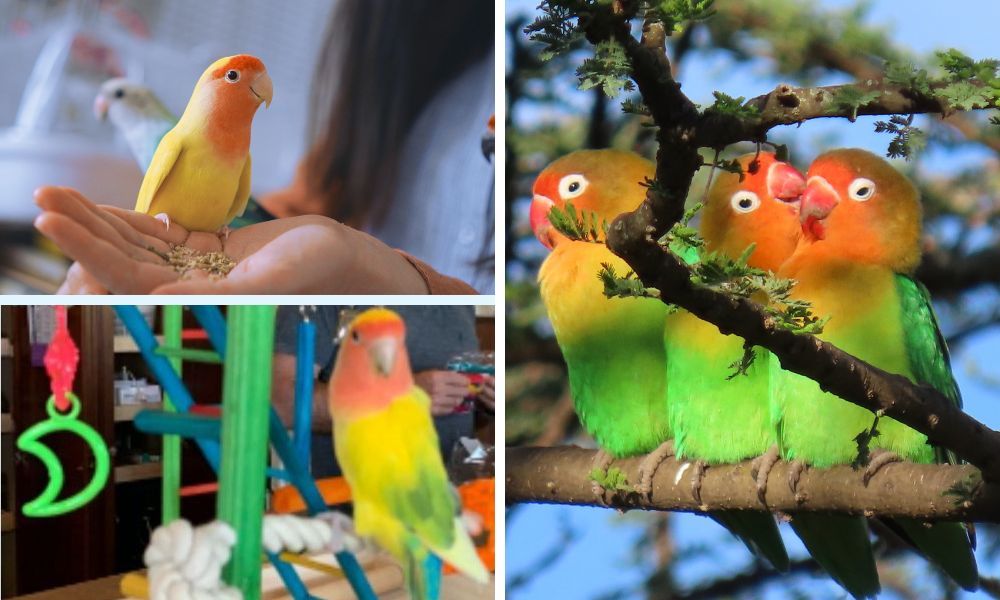
Love birds are popular pets because of their beautiful colors and affectionate personality. Many owners assume they are providing the right diet for their love birds, but may overlook key nutritional needs that are essential for their health. As a lover of these feathered creatures, it is important to ensure that they are well-fed and kept healthy. In this blog post, we will discuss the optimal feeding practices for love birds so that they can thrive and live a long life, reflecting the heightened awareness of bird nutrition that has led to improved feeding practices.
Wild Lovebirds
In the wild, love birds typically feed on a variety of fruits and vegetables. Wild lovebirds also consume seeds from different plants as a major part of their natural diet. They also may consume insects such as grasshoppers, beetles, and caterpillars. It is important to offer fresh foods to ensure that they remain nutritionally balanced for your pet bird. In the wild, food sources can include berries, leaf buds, vegetation, seed pods, seeds, nuts and other small edibles as they become available from one season to the next. Lovebirds consume seeds without the need for grit or gravel, as they remove the hulls before eating, unlike some other species such as pigeons that require grit to aid digestion. Additionally, it is essential to provide them with a source of calcium such as cuttlebone or mineral grit. Different species of lovebirds may have slightly varied diets in the wild.
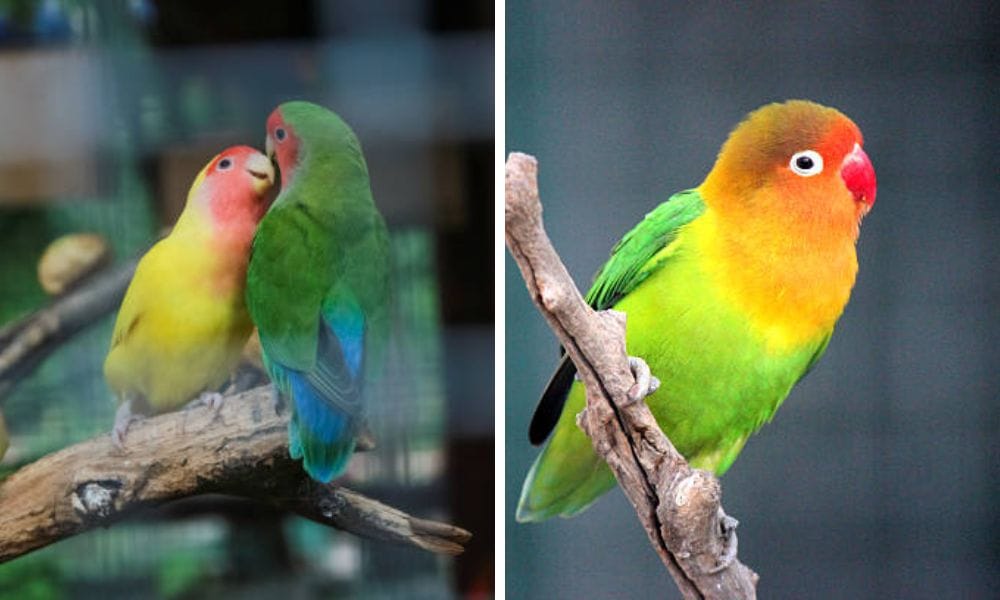
Domesticated Love Birds
Providing a proper diet is essential for domesticated lovebirds. When it comes to feeding domesticated love birds, there are a few different options. There are specialized pellets that can provide your pet bird with all the essential nutrients they need for optimal health. Pelleted diets are formulated to meet a bird's nutritional needs and are often recommended as a primary food source.
Alternatively, you can feed them seeds and other healthy snacks such as fruits, vegetables, and nuts. Commercial seed mixes are a convenient option, but they typically contain a limited variety of seeds and should not be the sole component of the diet, as they may not provide complete nutrition. It is important to ensure that these snacks are fresh and free of pesticides. Some foods from what the family eat, such as fruits, vegetables, lean meats, and dairy, can also be offered in moderation to add variety and support a balanced diet.
Additionally, it is essential to provide them with a source of calcium such as cuttlebone or mineral grit as well. Always use a clean food dish for all meals to encourage healthy eating habits and prevent contamination.
For personalized advice on ensuring your lovebird receives a proper diet, consult an avian veterinarian who can provide guidance tailored to your bird's specific needs.
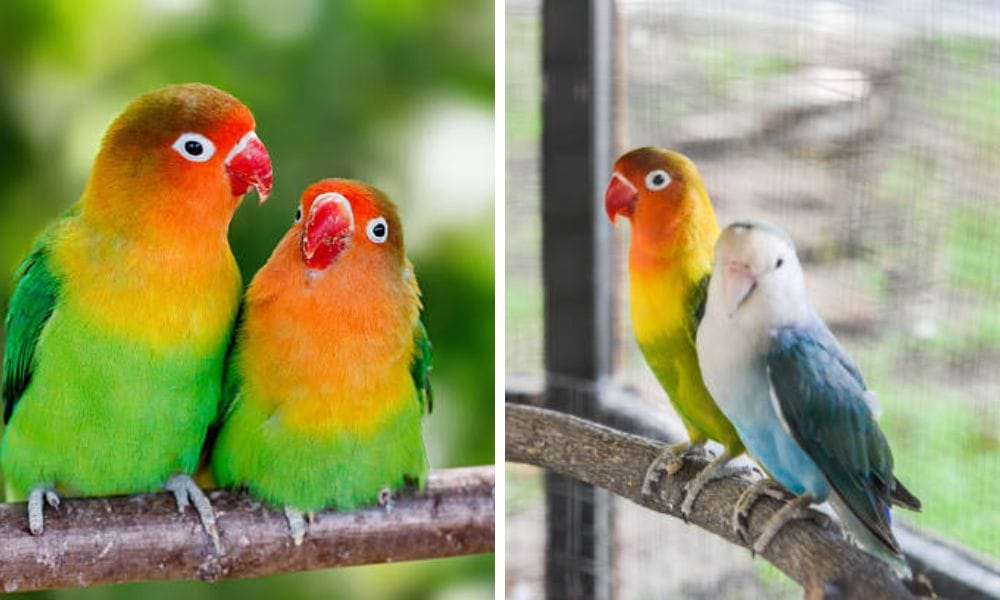
Seed Mixes vs. Pellets
One of the most common questions when it comes to love bird feeding practices is whether to use seed mixes or pellets. Many owners start with a seed diet, but this is not ideal, as seed mixes may be more appetizing for love birds, yet they are not nutritionally balanced. Pellets, on the other hand, contain all the nutrients that love birds need for optimal health. A formulated diet, such as pellets, is designed to provide complete nutrition and is considered the optimal choice for pet birds. Pelleted diets come in different formulations tailored to various life stages and specific health needs, ensuring that each bird receives the right nutrients. Pelleted foods are available for mature lovebirds and can help with converting seed eating birds to a healthier, balanced diet. Therefore, it is recommended to use pellets as the primary food source for love birds, supplemented with some seeds and fresh fruits and vegetables.
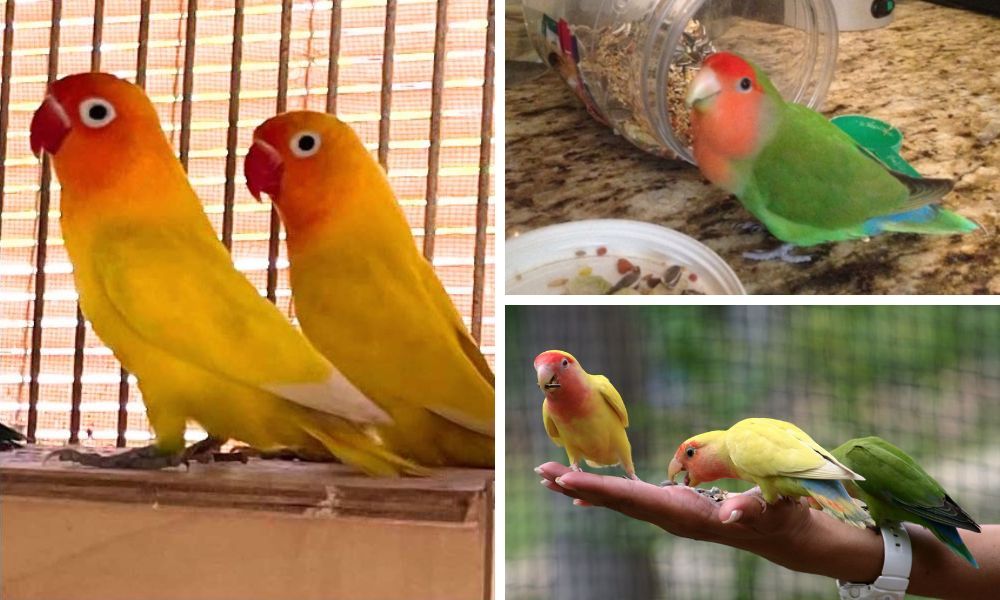
Fresh Fruits and Vegetables
Fresh fruits and vegetables are essential components of a lovebird’s diet. To encourage variety and prevent selective eating, offer each food item in a separate dish.
They provide vitamins, minerals, and fiber, which promote healthy digestion and boost their immune system. Some of the recommended
Water and Calcium
Water is crucial for a love bird’s hydration and overall health. Make sure to provide clean and fresh food and water at all times. Additionally, love birds need a source of calcium in their varied diet to maintain healthy bones and prevent disorders such as egg-binding. Cuttlebones, calcium blocks, and crushed eggshells are all great sources of calcium for love birds. Calcium supplementation may be especially important for birds that are laying eggs, as their nutritional needs change during this time. Consult a veterinarian for guidance on proper calcium supplementation during the egg-laying period.
Feeding Schedule
Establishing a feeding schedule for your love bird is important to maintain their weight and overall health. At each feeding, ensure a proper balance of nutrients by providing a mix of carbohydrates, proteins, fats, vitamins, minerals, and water tailored to your bird's species. Love birds should be fed twice a day, with their primary meal in the morning and a smaller meal in the evening. It is also important to monitor their nutritious food intake, as overfeeding can lead to obesity and health issues. A general guideline is to offer no more than two tablespoons of pellets or seeds per day, along with fresh fruits and vegetables, while monitoring intake to support your bird's health.
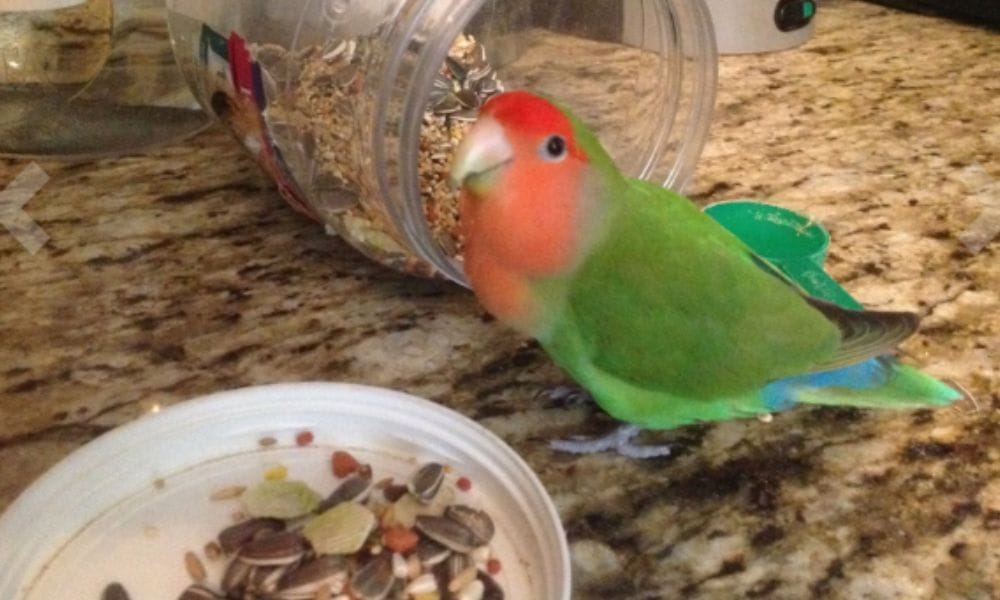
Treats
Treats can be a great way to bond with your love bird and provide them with some variety in their diet. However, it is important not to overdo it with treats, as they can be high in sugar and fat. Millet seed and millet spray are popular treats but should be given sparingly, as they are nutrient-deficient and should not be a primary food source. Stick to healthy treats like millet sprays, small amounts of plain popcorn, or unsalted nuts. Honey sticks are often offered to lovebirds, but they are not nutritionally complete and should not be relied upon as a regular treat. Avoid giving your love bird treats that contain chocolate, caffeine, or alcohol, as these can be toxic to birds. Alcoholic beverages are particularly dangerous and must be strictly avoided. Also, do not offer junk food to your lovebird, as processed snacks and human junk foods are unhealthy and provide little nutritional value.
Pelleted Lovebird Food
Pelleted food is a great way to ensure that your pet bird is getting all the essential nutrients they need for optimal health. Pelleted diets are available for different life stages, allowing you to tailor nutrition to your bird's age, condition, and specific needs. These diets are complete and balanced, meaning they contain all the vitamins, minerals, and amino acids required for healthy growth, feather development, and overall well-being. Some birds may require extra vitamins or specific vitamins during certain life stages, such as breeding or periods of stress, so it's important to assess their needs with a veterinarian. Additionally, many pelleted diets contain probiotics which can help with digestion and nutrient absorption. Additionally, pellets are generally easier to store than seeds, as they have a longer shelf-life.
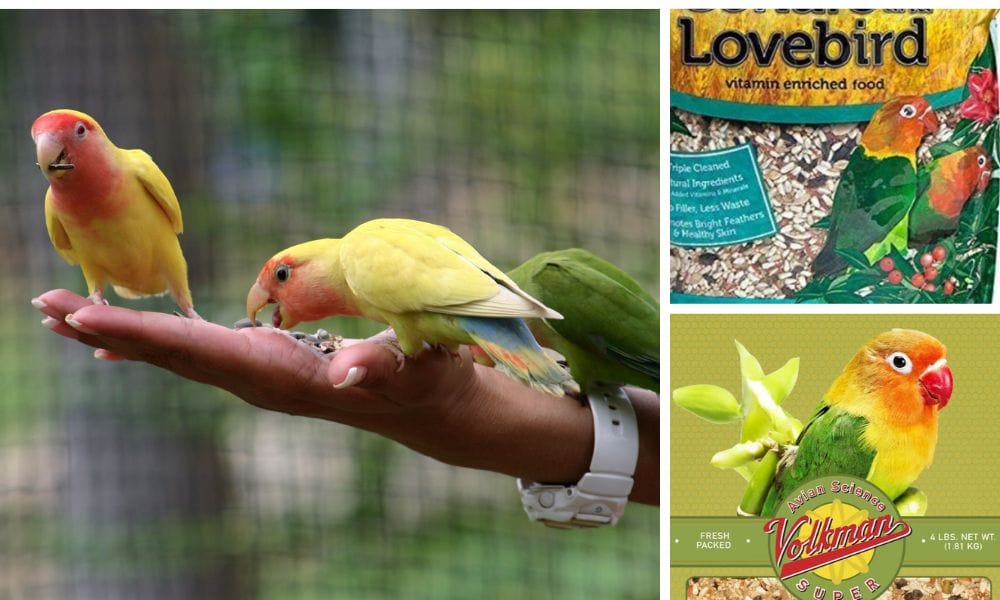
Baby Lovebirds
Baby lovebirds have different nutritional needs than adults. Hand raised babies and extremely young lovebirds have unique nutritional requirements that must be carefully met. They require a higher fat content in their diet to support their rapid growth and development. It is important to provide them with a specialized baby bird formula that contains high-quality proteins, fats, carbohydrates, vitamins, and minerals. When raising young lovebirds, proper nutrition is crucial to ensure healthy development and to support their specific dietary needs during this critical stage. Additionally, it is essential to ensure they have access to fresh fruits and vegetables as well as cuttlebone or mineral grit for calcium.
Overall, feeding your love bird the right food is essential to maintain their health and wellbeing. Make sure to provide a balanced diet of pellets, fresh fruits and vegetables, and occasional treats for optimal nutrition. Give them enough water throughout the day and make sure they have access to calcium sources like cuttlebones or crushed eggshells. Lastly, establish a feeding routine that works best for you and your love bird. With proper care, your feathered friend will be sure to live a long and happy life!
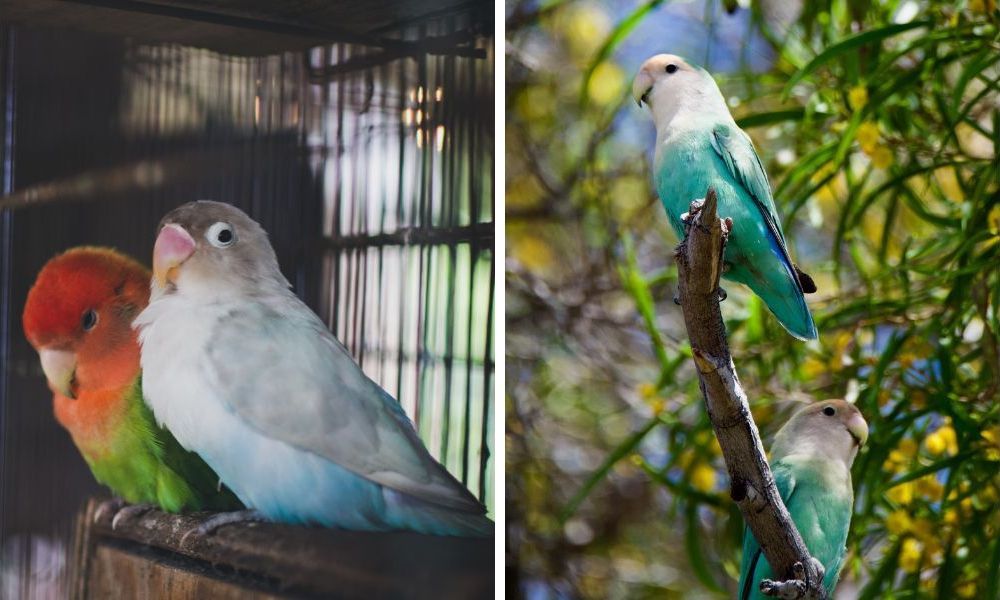
FAQs
What is the best bird food for lovebirds?
The best lovebird food is an ideal diet that includes a balanced combination of pellets, fresh fruits, fresh vegetables, and occasional treats. Pellets are the most nutritionally balanced option for providing essential vitamins and minerals to your pet bird. A formulated diet, such as high-quality pellets, ensures your lovebird receives a complete and species-appropriate nutrition, supporting optimal health and longevity. Additionally, it is important to provide them with fresh produce and calcium sources like cuttlebone or mineral grit. Conditioning foods, such as specially formulated seed mixes, can also play a role in maintaining your lovebird's health, supporting molting, vocalization, and overall well-being.
How often should I feed my lovebird?
It is recommended to feed your lovebird twice a day, with their primary meal in the morning and a smaller meal in the evening. A general guideline is to offer no more than two tablespoons of pellets or seeds per day, along with fresh fruits and vegetables.
What treats can I give my lovebird?
Treats should be given in moderation. Stick to healthy treats like millet sprays, small amounts of plain popcorn, or unsalted nuts. Avoid giving your love bird treats that contain chocolate, caffeine, or alcohol, as these can be toxic to birds.
Some products are marketed as "song foods" or "molting foods," but these are simply different seed mixes and do not offer unique nutritional benefits. A balanced diet is still the most important factor for your lovebird's health.
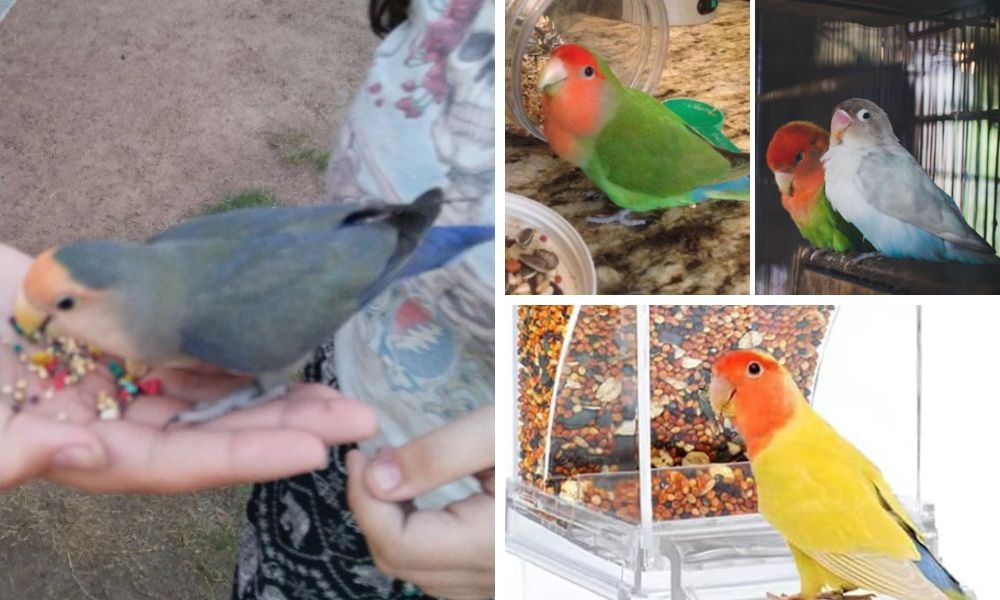
What food should I give baby lovebirds?
Baby lovebirds require a higher fat content in their diet to support their rapid growth and development. It is important to provide them with a specialized baby bird formula that contains high-quality proteins, fats, carbohydrates, vitamins, and minerals. Additionally, it is essential to ensure they have access to fresh fruits and vegetables as well as calcium sources like cuttlebone or mineral grit.
Is seed mix good for pet birds?
Commercial seed mixes are convenient, but they are not nutritionally complete and should only be a supplement to a love bird’s diet, not the primary food source. Feeding just seeds can lead to poor nutrition and health problems, as these mixes often contain a limited variety of seeds that are high in fat and lack essential nutrients. Pelleted diets are complete and balanced, meaning they contain all the vitamins and minerals required for healthy growth and development. Look for a seed mix that has a wide variety of seeds like millet, canary grass seed, hulled oats, niger seed, flax seed, sunflower seeds, safflower, and grape seeds. It is important to offer variety in their diet, so seeds can be used to provide additional nutrition and flavor to your love bird’s meals.
Are fruits and vegetables good for lovebirds?
Fruits and vegetables are great sources of vitamins, minerals, and fiber that can help promote healthy digestion and boost their immune system. Offering different foods, including a variety of fruits, vegetables, seeds, and formulated diets, is important to ensure lovebirds receive a balanced and nutritious diet.
Some of the recommended fruits and veggies for love birds include apples, bananas, blueberries, grapes, carrots, broccoli, and spinach. However, it is important to note that some fruits and vegetables can be toxic to birds, so it is best to research which ones are safe for them.
Just like other animals, lovebirds require a varied diet to meet their specific nutritional needs and to prevent malnutrition.
What feed do lovebirds eat?
Lovebirds eat a variety of feed including pellets, seeds, and fresh fruits and vegetables, all of which are essential components of a healthy lovebird's diet. Pelleted diets are complete and balanced, meaning it contains all the vitamins and minerals required for healthy growth and development. Additionally, many pelleted diets contain probiotics which can help with digestion and nutrient absorption. Seeds can also be offered as an additional food source to provide a variety of flavors and textures. Lastly, fresh fruits and vegetables are a great source of vitamins, minerals, and fiber that can help promote healthy digestion and boost their immune system. You can read more about what to feed your lovebirds here or by clicking the picture below.
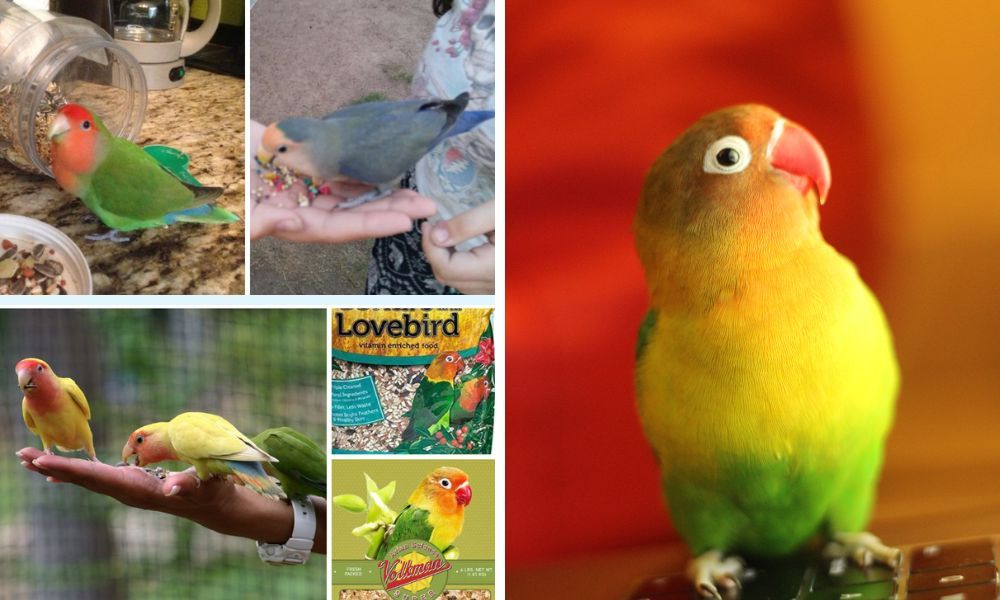
What vegetables do lovebirds eat?
Some of the recommended vegetables for love birds include carrots, broccoli, peas, spinach, kale, and bell peppers. However, it is important to note that some fruits and vegetables can be toxic to birds, so it is best to research which ones are safe for them. Additionally, make sure to wash all produce thoroughly before feeding it to your pet bird.
What bird food can lovebirds not eat?
Lovebirds should not be given treats that contain chocolate, caffeine, or alcohol as these can be toxic to birds. Some foods, such as avocado and onion, are considered potentially toxic and should always be avoided to ensure your bird's safety.
Additionally, it is best to avoid offering any processed or fried foods such as chips and French fries. Dairy products, such as cheese and milk, should also be limited or avoided because lovebirds are lactose intolerant and these foods are not ideal for their health.
Lastly, refrain from feeding your love bird avocados as they are also known to be toxic.
Can love birds eat rice?
Rice can be a safe addition to your love bird's diet, but it should not be the main source of nutrition. Rice is low in protein and other essential nutrients and should only be fed as an occasional treat. Additionally, many pelleted diets are enriched with rice or other grains which provide all the necessary vitamins and minerals for healthy growth and development.
Can lovebirds eat bread?
Bread should generally be avoided in a love bird’s diet as it is low in nutrients and can cause digestive issues. Instead, focus on providing a balanced diet of pellets, fresh fruits and vegetables, and occasional treats for optimal nutrition. Give them enough water throughout the day and make sure they have access to calcium sources like cuttlebones or crushed eggshells. With proper care, your feathered friend will be sure to live a long and happy life! Owners should continually strive to improve their lovebird's nutrition by staying informed and consulting with avian experts. See our list best of love birds food below by clicking the picture below.
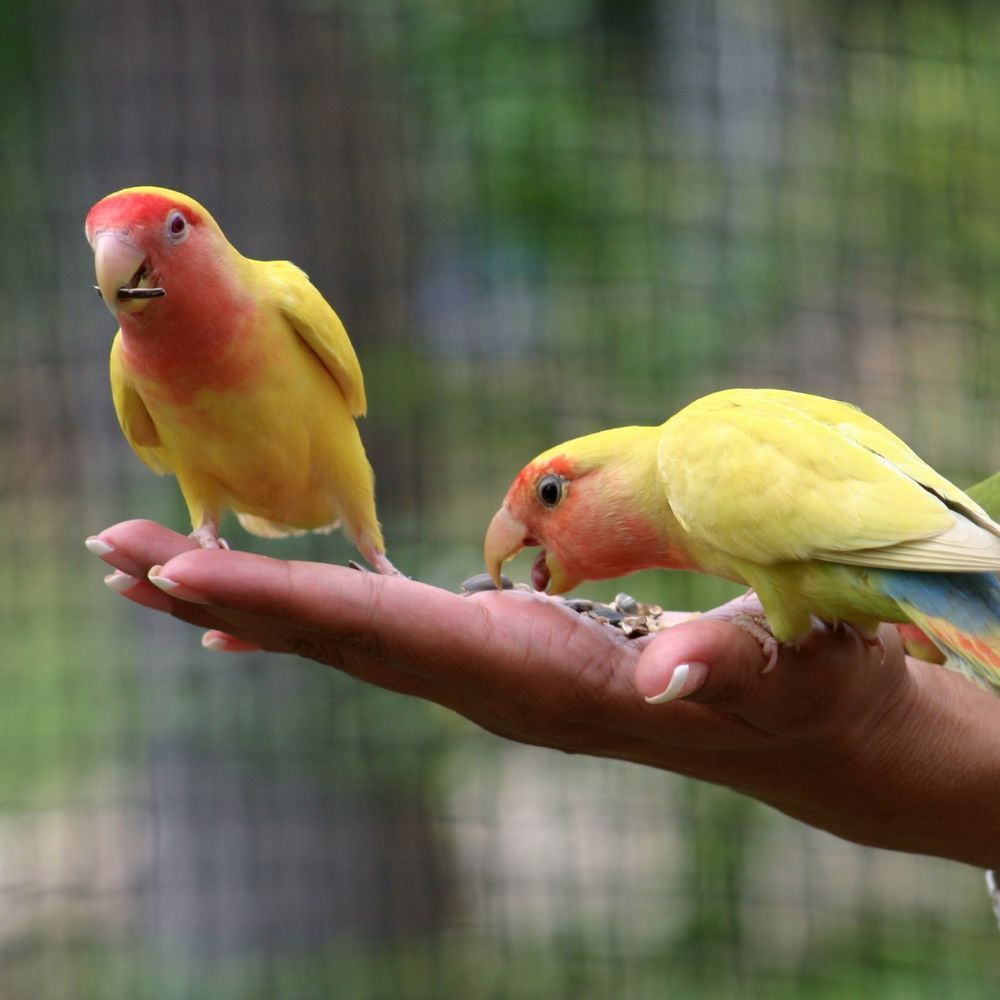
At the end...
proper feeding practices are essential for the health and well-being of your love bird. Improper feeding can lead to ill health and health problems, so it is crucial to pay attention to your bird's diet. A diet consisting of pellets, fresh fruits and vegetables, and sources of calcium is necessary to ensure that your bird receives the proper balance of nutrients. Additionally, establishing a feeding schedule and monitoring your bird’s food intake can prevent health issues such as obesity. Remember to provide clean and fresh water at all times, and only provide treats in moderation. Taking care of your love bird’s nutritional needs will help them live a long and happy life. Check out our top 5 picks for the best bird food for lovebirds by clicking the button below!

